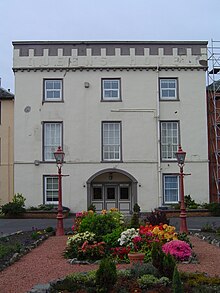What a stunning church we could see from the road just outside of Helensburgh and I just had to drive in.
Saw this guy sitting very proudly over looking the grave yard and Helensburgh and noticed he was sitting at 45deg to all the other tombstones.
Love a man that likes to stand out in the crowd even if the crowd is a quiet bunch!
The whole place was full of very old graves, a bit overgrown and with out any colour.
Henry needed someone to just know he is here today and that someone did care.
After getting home I goggled Helensburgh and well it would seam that good old Henry was a man to stand out in a crowd.
I was honoured to have meet you today Henry
Henry Bell and the "Comet"
Henry Bell (1767-1830) had arrived in Helensburgh by 1806. By training he was a millwright, but he had also worked for a period in a shipyard at Bo'ness. He probably designed and built the Baths Inn which he and his wife then ran as a hotel; he designed and built other buildings, such as Dalmonach Works at Bonhill in West Dunbartonshire (now demolished) and St Andrew's Parish Church in Carluke in South Lanarkshire. The Baths Inn later became the Queen's Hotel, and it is now private accommodation as part of Queen's Court at 114 East Clyde Street. At that time the taking of baths—hot and cold, fresh water and salt water—was considered to be advantageous to the health. As a result of his initiative Helensburgh began to develop as a holiday resort, and Bell also served as the town's first recorded Provost from 1807-09.[8]
The working replica of the "Comet" is in Port Glasgow; it was built in 1962 for the 150th anniversary
Love Mr Google!







Love history.
ReplyDeleteMe Too
Delete